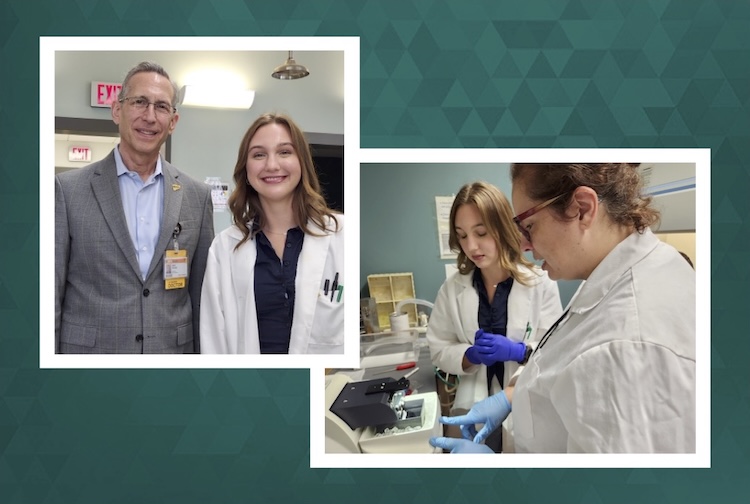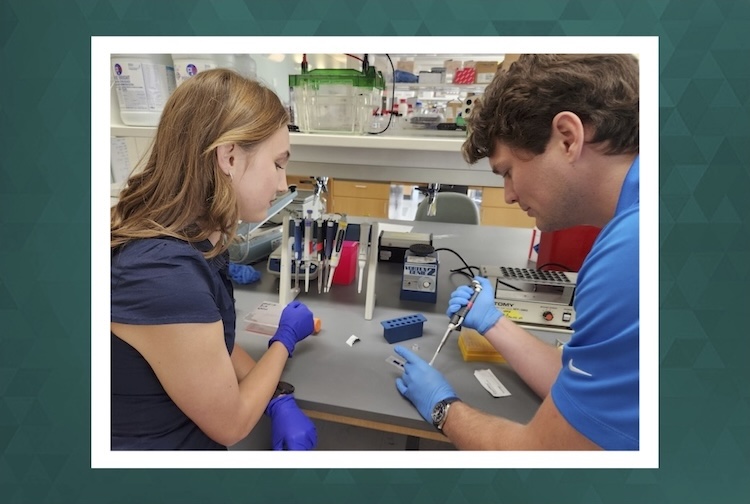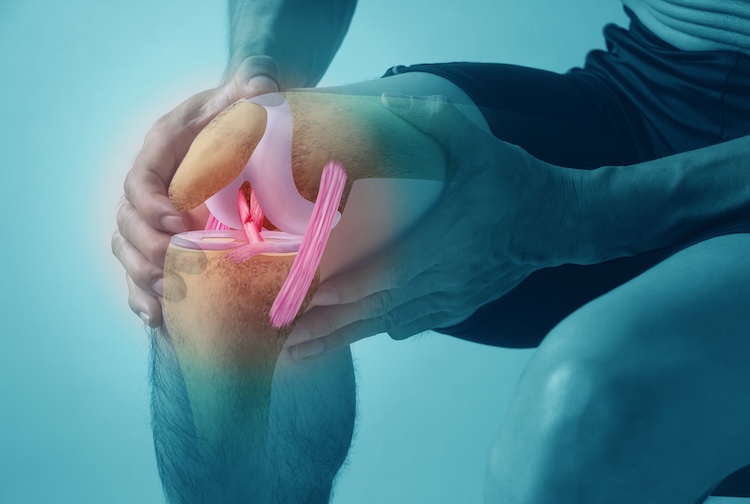Summer of science: Georgia teen joins her former hepatologist to learn about research at VCU liver institute
The former patient of Saul J. Karpen, M.D., Ph.D., also supports liver research through concert fundraisers.
August 05, 2025 Sydney Moss (middle) spent time this summer at the VCU Stravitz-Sanyal Institute for Liver Disease and Metabolic Health with her former doctor, Saul J. Karpen, M.D., Ph.D. (left), who is the institute’s chief scientific officer. (VCU Stravitz-Sanyal Institute for Liver Disease and Metabolic Health)
Sydney Moss (middle) spent time this summer at the VCU Stravitz-Sanyal Institute for Liver Disease and Metabolic Health with her former doctor, Saul J. Karpen, M.D., Ph.D. (left), who is the institute’s chief scientific officer. (VCU Stravitz-Sanyal Institute for Liver Disease and Metabolic Health)
By A.J. Hostetler
Most teenagers prioritize spending their summer break with friends at a local pool or going on trips to the beach – far away from school and textbooks.
But that’s not what 17-year-old Sydney Moss aspired to do this summer. The Georgia teen, whose music raises funds for research on a rare pediatric liver disease, finally achieved her dream: stand side-by-side with her former hepatologist in a lab at Virginia Commonwealth University’s Stravitz-Sanyal Institute for Liver Disease and Metabolic Health.
Shortly after Sydney was born, doctors noticed she looked yellow, a sign of jaundice. They discovered that she had high levels of bilirubin, the yellowish substance made when the body breaks down old red blood cells. Bilirubin is found in bile, a fluid made by the liver makes to help digest food.
In the following weeks, she was diagnosed with biliary atresia (BA), a rare and potentially deadly liver disease in newborns. Biliary atresia affects approximately 1 in 8,000 to 18,000 newborns each year, according to the American Liver Foundation. It occurs when the flow of bile from the liver to the intestine is blocked. It is the leading cause of liver transplants in infants. Early detection and treatment can significantly improve outcomes and reduce the need for liver transplantation.
As she grew, Sydney says she “felt fine.” She was active in sports and school, always up for an energetic vacation in the family camper.
When she was 13, she needed medical care after suffering what she thought was altitude sickness while on vacation.
“Her quality of life wasn’t really impacted until the liver started to affect the lungs, which became very noticeable when we went hiking in Utah,” said Sydney’s mother, Lindsay Moss.
One of the most rewarding aspects of being a physician, and certainly one that drew me in to caring for children with liver disease, is helping children like Sydney grow up, adapt to a serious condition and not be defined by it.
Saul J. Karpen, M.D., Ph.D., chief scientific officer of the VCU Stravitz-Sanyal Institute for Liver Disease and Metabolic Health
An appointment with her hepatologist, Saul J. Karpen, M.D., Ph.D., pinpointed the source of her breathlessness and low oxygen levels: hepatopulmonary syndrome, a rare lung complication that can happen in cases of cirrhosis like biliary atresia.
Karpen, now the chief scientific officer of VCU's liver institute, told Sydney and her family that her care team at Children’s Healthcare of Atlanta needed to act swiftly, including incorporating heart and lung specialists into her care, and initiating the process to put her on the liver transplant list.
“It was a lot to take in,” Sydney said. “He was telling me that I needed a liver transplant, the only treatment for BA.”
She received a new liver just a few months later on July 4, 2021.
“One of the hardest parts of transplant was at discharge, when they informed us that Sydney was now a patient of the transplant team, not a patient of Dr. Karpen,” Lindsay said.
Sydney did not let go of Karpen so easily.
“Throughout her life, Sydney has been a participant in many BA research studies,” Lindsay explained. “We are big believers in research and education, and because BA is so rare, having Sydney be a part of those studies was important to us. As she got older, she began to have an interest with the research and Dr. Karpen would explain it to her. At every appointment, he would have a research update and he and Sydney would talk about it.”
Music fuels medical innovations
Beginning in middle school, she would ask if she could shadow Karpen in his lab. Her requests didn’t stop, even after he accepted the position with the VCU liver institute in 2024.
“She is extremely passionate about BA research, so much so that when Dr. Karpen left [Atlanta], Sydney asked us how she could give to VCU so she could continue to support his research. And that's why we established The Sydney Moss Fund,” her mother said.
Sydney’s passion for supporting BA research and philanthropic causes dates back to when she had her liver transplant. She’s organized fundraising concerts, called “Concert for a Cause,” tapping friends, music teachers and others to join her on stage with her guitar. Her goal is to raise $100,000 for research before graduating from high school.
We are big believers in research and education, and because [biliary atresia] is so rare, having Sydney be a part of those studies was important to us. As she got older, she began to have an interest with the research and Dr. Karpen would explain it to her.
Lindsay Moss, Sydney’s mother
“I was impressed by Sydney’s understanding of the need for support for research in rare diseases,” Karpen said. “She and her parents understood that diseases like biliary atresia do not get better by magic – they need attention and focused research. And that there needs to be support to do so. I was impressed by Sydney’s understanding of the need for support for research in rare diseases, that she took her own talents as a songwriter and singer, to fundraise.”
So far, Sydney’s “Concert for a Cause” has raised a total of $80,000, and she hopes to raise another $20,000 through the next concert in March 2026. The money goes to a foundation, whose recipients of support includes Karpen’s research. Earlier this year, her philanthropic efforts were recognized with an award from the Association of Fundraising Professionals.
Summer at Camp Karpen
This summer, Sydney got to see what her fundraising indirectly supports. She was finally old enough to participate in lab work, and Karpen was happy to have her join the team.
As luck would have it, she has a great-aunt in Henrico County with whom she could stay. Sydney arrived in Richmond in mid-June to spend several weeks in Karpen’s lab. She knows this isn’t how typical rising high school seniors spend their summer vacations.
“I love to learn. I love biology, especially since I had lots of doctor appointments. I stayed in touch with Dr. Karpen when he moved to Richmond, partly to let him know about my concerts,” Sydney said.
She joined meetings with Karpen’s lab team, read numerous research papers on the genetics of and treatment for BA, learned to sort for murine cholangiocytes by using flow cytometry-based cell sorting after labeling them with specific antibodies and observed lab technicians with the institute’s biorepository slicing livers to prepare for microscope slides.
“I learned more biology during my time here than in a single semester of biology in ninth grade,” she said.
Karpen says he wanted Sydney to have the opportunity to explore her interest in a future in science and medicine.
“By seeing how science is actually performed, how discoveries are made and then applied, is how we encourage people like Sydney to pursue such a meaningful career,” he said.

17-year-old Sydney Moss (left) worked alongside VCU researchers and laboratory technicians, like Matthew Dalton (right), over the summer. (VCU Stravitz-Sanyal Institute for Liver Disease and Metabolic Health)
Karpen’s laboratory technician, Matthew Dalton, patiently answered many of Sydney’s questions.
“Sydney showed a relentless determination to dive headfirst into the world of medical research. She was very quick to grasp a variety of advanced concepts and excelled in hands on wet lab bench work,” Dalton said.
Watching Karpen in his role as chief scientific officer was eye-opening for Sydney, who had only known his as a doctor.
“I really enjoyed seeing what Dr. Karpen does come to life. It’s amazing to me that people do this for a living,” she said.
Sydney plans to study AP biology and anatomy this fall, as part of her plan to pursue her interest in health policy and medical school. She’s passionate about medical research and hopes to support scientific research in the public health field.
“People think of research as really abstract. They don’t understand the importance of it until they need it,” she said.
Karpen, the president-elect of the American Association for the Study of Liver Disease, is the co-author of American Academy of Pediatrics’ screening strategy to detect biliary atresia in newborns. His research efforts in biliary atresia led to identification of the first genetic defect linked to the congenital condition in 2019.
That came about, in part, due to Sydney, Karpen says.
“It is through their family and Sydney’s personal attention that contributions provided enough financial support to discover the first genetic cause of this important disorder.
“One of the most rewarding aspects of being a physician, and certainly one that drew me in to caring for children with liver disease, is helping children like Sydney grow up, adapt to a serious condition and not be defined by it,” Karpen said.
See how VCU’s Stravitz-Sanyal Institute for Liver Disease and Metabolic Health is making an impact
Learn more about our innovative researchers and their projects




